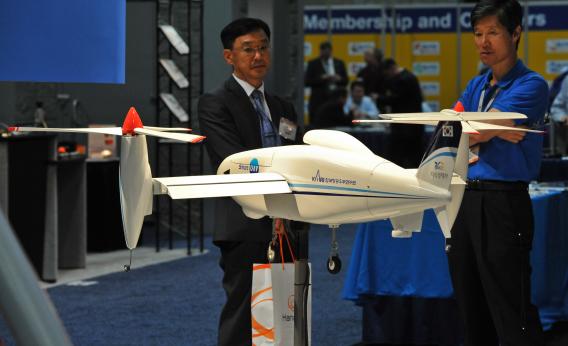Are Guidelines Issued by Drone Industry an Attempt To Avoid Government Regulation?

Photo by NICHOLAS KAMM/AFP/Getty Images
The growing use of drones in the United States is facing firm opposition from civil liberties groups and some legislators, like Sen. Rand Paul, R-Ky., and Rep. Austin Scott, R-Ga.. But in what could be a bid to stave off restrictive regulations, a powerful industry group has published a drone code of conduct (see below) that it claims will help address privacy concerns and ensure the aircraft are “integrated responsibly” into airspace.
The Association for Unmanned Vehicle Systems International represents more than 7,000 members in 55 countries. Among its many corporate members are major players in the drone business, like General Atomics Aeronautical Systems, which makes the Predator RQ-1, BAE Systems, Northrop Grumman, and Lockheed Martin.
AUVSI says it recognises that the drone industry is obligated to “conduct our operations in a safe manner that minimizes risk and instils confidence in our systems.” It therefore hopes the code of conduct—a voluntary set of guidelines—will ensure "safety, professionalism and respect" for drones. The industry members who adopt the code promise that they will “respect the privacy of individuals,” not operate drones in a way that could cause undue risk, and comply with all relevant federal, state, and local laws.
The drone industry is worth billions of dollars and is well on its way to transforming airspace as we know it. However, one of the most significant barriers the industry faces is undoubtedly public opposition. There are critics on all sides of the political spectrum. In the United States, that includes not only campaign groups like the Electronic Frontier Foundation and the ACLU, but also libertarian Fox News firebrands.
Given the scale of drone opposition, it is not difficult to conclude that AUVSI’s code of conduct is little more that a public relations effort. Voluntary industry codes of conduct are often rooted in a desire to limit statutory regulations enforced through law, and this case seems no different. AUVSI has a huge vested interest in the economic success of drones, and that success could be significantly hindered by political opposition and a rigid legal framework.
There are already 64 drone bases in the United States, and about 300 law enforcement agencies and research institutions have temporary licenses to fly them. But after Congress passed a bill mandating clearance for domestic drone use in February, a backlash ensued. Last month legislation designed to prohibit the use of drones without a warrant was introduced to the Senate. Meanwhile EFF is encouraging people to contact their local municipal government and ask for a drone ban.
To read the AUVSI guidelines, click through.
Future Tense is a partnership of Slate, New America, and Arizona State University.

